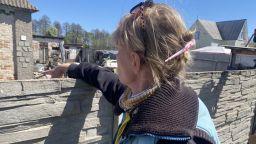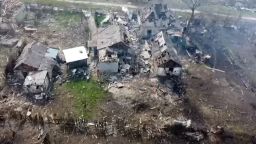Iryna Danylovich’s family and friends have no idea where she is.
The Crimean human rights activist and nurse disappeared on her way home from work in the Russian-annexed peninsula more than a week ago. She has not been seen since.
Danylovich is believed to have been detained by Russian authorities, but they have refused to say whether, where or by whom she is being held. “We assume that she is still in jail,” Danylovich’s lawyer Aider Azamatov told CNN.
Danylovich’s father Bronislav told the news site Krym.Realii, a Radio Liberty affiliate, that his daughter planned to take public transport home on the morning of April 29, after finishing her shift at a medical facility in Koktebel, south-eastern Crimea.
Azamatov said the nurse stopped answering her phone at that point.
At around the same time, Azamatov said, balaclava-clad officials from the Russian special police unit came to the house Danylovich shares with her parents in the village of Vladislavovka, near Feodosiya. Vladislavovka is about 34 kilometers (21 miles) from Koktebel.
He told CNN that the officials who searched the family’s house told her father she had been sentenced to 10 days of administrative arrest for “the transfer of unclassified information to a foreign state.”
But the authorities have refused to hand over a copy of the decision, according to Azamatov. He has still not seen any official documents regarding Danylovich’s arrest. He has not been allowed access to his client.
“Iryna does not have a procedural status, which is why they hide her from me,” he said.
Azamatov, Danylovich’s family and several human rights organizations have been searching for her at detention centers in multiple cities in Crimea ever since her disappearance.
Azamatov said he has checked seven pre-trial detention centers and special detention centers across the region himself, with no luck.
Crimean authorities have refused to comment. The officer on duty at the prosecutor’s office for Russian-occupied Crimea referred CNN to authorities in Danylovich’s hometown.
When CNN reached the police station in Feodosiya on Tuesday, the person who answered the call said they knew nothing about the case and hung up.
The Ministry of Internal Affairs of Russian-occupied Crimea did not respond to a written request for comment. A phone number listed on its website is not reachable.

On May 6 – Danylovich’s 43rd birthday – human rights activists left gifts outside one of the detention centers, even as they were told she was not being held there.
Through her work as a citizen journalist, Danylovich has exposed problems in Crimea’s health care system, including in its response to the coronavirus pandemic. She has written for a number of Ukrainian media outlets and has published her findings on Facebook.
“The abduction of Iryna Danylovich has signs of enforced disappearance under the International Convention for the Protection of All Persons from Enforced Disappearance,” Crimea SOS, a Ukrainian human rights NGO, said in a statement.
The term enforced disappearance describes disappearances either perpetrated by state actors or by others acting on behalf of, or with the support of, state authorities, followed by a refusal to disclose the person’s fate and whereabouts.
Because the authorities refuse to acknowledge detention, the victim doesn’t have any legal protection and perpetrators are rarely prosecuted, according to the UN.
The UN says the practice is often used as a strategy to spread terror within the society.
Other than telling Danylovich’s father verbally during the search that his daughter was arrested, the authorities have never officially acknowledged her detention or provided any reason for her to be held.
“As of May 7, the ninth day after she went missing, [nothing is known] about where Iryna Danylovich stays and in what status,” Zmina added.
Danylovich’s case is the latest in a string of disappearances of activists, journalists and ordinary citizens reported over the last decade in Crimea.
According to a report published in March 2021, the UN Human Rights Office documented at least 43 cases of enforced disappearances in Crimea between 2014 and 2018.
The UN said they were mostly abductions and kidnappings and that some of the victims – 39 men and four women – had been subjected to ill treatment and torture. Eleven of the men remained missing, and one man remained in detention at the time of the report.
The UN said they had not been able to document any prosecutions in relation to any of the cases.
Azamatov said Danylovich’s parents told him that the people who entered their home were wearing civilian clothes; none of them introduced themselves or showed ID. Instead they read out the warrant and began searching different rooms at the same time, the couple said.
They said the officials confiscated all electronic equipment, including three phones that no longer work, and several books, including a publication by Viktor Suvorov.
Suvorov, whose real name is Vladimir Bogdanovich Rezun, is a former Soviet spy who defected to the UK and reinvented himself as an author of books about World War II.
Danylovich’s parents told Azamatov that the officers refused to leave them a copy of the list of seized items or a copy of the report of the search.
On May 2, Azamatov appealed to the authorities and Danylovich’s parents filed a statement to the police.
“My appeals to the Prosecutor’s Office of Crimea, to the Military Prosecutor’s Office, to the Military Investigative Committee and to the Investigative Committee of Russia have not yet been answered. There is an appeal to the police from the father, there is no answer yet,” Azamatov said.
Bronislav Danylovich said he had seen a security video which appeared to show the moment his daughter was abducted.
He told Krym.Realii that he saw CCTV footage from one of the gas stations on the way out of Koktebel showed a woman, in clothes similar to the ones Danylovich was wearing when she disappeared, standing at a bus stop.
He said the clip showed a black car drive up, several people in civilian clothes jump out and – despite the woman’s resistance – push her into the vehicle.
Azamatov told CNN the gas station refused to hand over the footage and that after seeing the video, Bronislav Danylovich filed a new statement with the police demanding that a criminal case be opened.
“Now we are waiting for a video from the place of her abduction, they promised to provide it so that I could study it,” Azamatov said.
Meanwhile, a group of 19 human rights institutions is appealing to agencies and officials at the United Nations, the Council of Europe and the European Union to help in Danylovich’s case.
The Committee to Protect Journalists (CPJ) has urged Russian authorities in Crimea to “immediately come forward with any information regarding Danylovich’s whereabouts and let the media work freely.”
Gulnoza Said, CPJ’s Europe and Central Asia program coordinator, said in a statement. “Iryna Danylovich’s alarming disappearance prompts fears of yet another clampdown on independent reporting in Russian-occupied Crimea, which is already an extremely restrictive environment for the press.”
CNN’s Anna Chernova contributed reporting.








